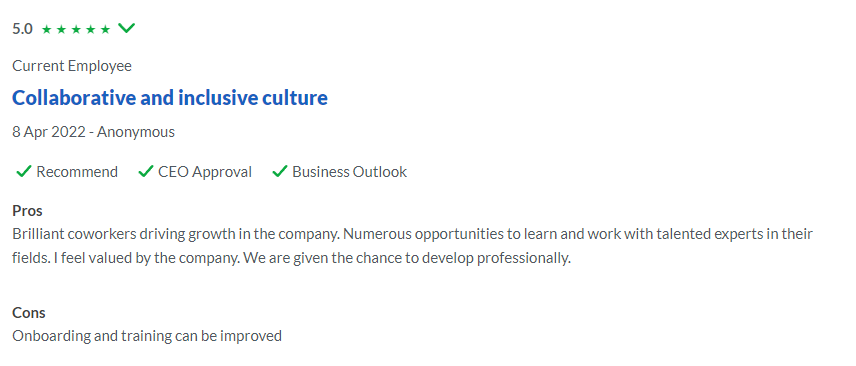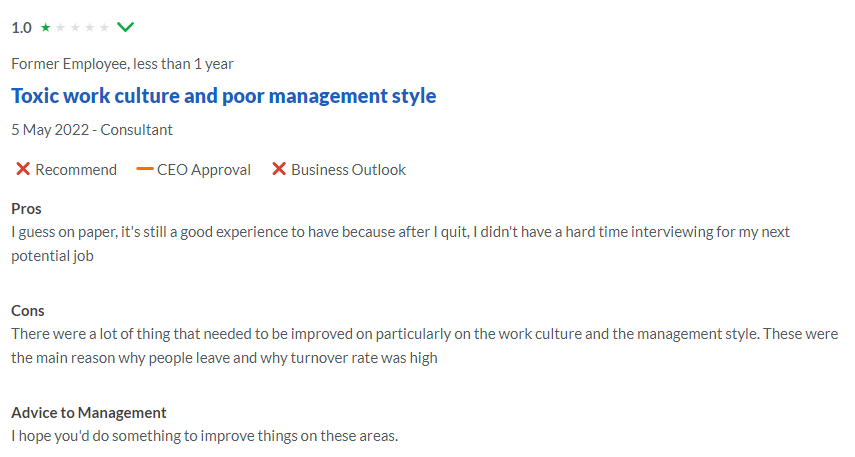
Are Glassdoor reviews anonymous? Or can I make amends?!
Wondering “are Glassdoor reviews anonymous?” You can still improve your workplace culture, but you need to act fast.
Table of Contents
Glassdoor reviews are to employees what Google reviews are to consumers. But, if a business has negative feedback from employees, chances are that this can trickle into the consumer sphere. Many won't support a business if it treats its staff poorly.
When business giant, Amazon, was found to be short-changing staff, existing customers felt unsettled. Consumers want full transparency and ethical practices, so Glassdoor reviews aren't just confined to the employee-business relationship, it transcends that.
Every day, happy and disgruntled employees leave a review about their workplaces on Glassdoor. After all, it's one of the largest employee review sites. In turn, thousands of potential and talented candidates flock to Glassdoor to see how a business stacks up as an employer. In fact, as many as 86% of employees look at employee review sites before applying for a job.
Employee reviews on Glassdoor can be unfiltered, cutting, glowing or fake. And, if you have negative reviews as the majority, it's a loss for your business.
There's just one small problem. Glassdoor employee reviews are posted anonymously.
This means it won't be as simple to make amends if you don't know who posted the review. You'll be facing an uphill battle with your company's reputation.
You definitely want to make amends if there are negative reviews about your company - but is this impossible if you don't know who actually left the negative review?
Even though the reviews are anonymous, don't panic. There are still a few ways to protect your reputation.
Glassdoor operates on review anonymity
When registering for a Glassdoor account, users submit their personal data, such as their names and email addresses.
Their IP addresses are also accessible by Glassdoor. However, subsequent reviews remain anonymous. Their name and email addresses will not appear next to their review. It will either state Former Employee or Current Employee.


As per Glassdoor's guidelines, they will still not give out the name of the reviewer even if you, the employer, request personal details. But, as all businesses want honest reviews, it might not feel fair that Glassdoor grants such anonymity to the employee, or the presumed employee - especially if you want to learn and respond to the review properly.
Legal systems
If you decide to take legal action, in Glassdoor's words, "we fight for the user's First Amendment right to post opinions anonymously". According to the company, courts have almost always ruled in favour of Glassdoor in cases where employers fight to refute employee anonymity.
In some cases, a court order can refute the employees' rights to remain anonymous. So, we can say that Glassdoor reviews are anonymous to a certain extent and present legal risks for employees.
In one case, a federal court decided Glassdoor reviewers are not entitled to anonymity.
Furthermore, governments can compel the company to provide information about an online reviewer. In the ruling, the court cited that reviews are not political speech and are not protected.
Even with the legal aspect, it's not easy to reveal who a Glassdoor reviewer is. Plus, it would cost your company a boatload of resources and possibly ruin your reputation along the way when taking legal action to uncover a reviewer.
Looking closely at a review can give you a clue about the employee
If a review were left by someone who worked in your company in the late 80s, you wouldn't have as much luck figuring out who the employee is. However, most reviews are left by recently fired employees or those who resigned recently. If your organisation has a reputation management team in place, reading between the lines of a review can help reveal which employee left a review.
Usually, disgruntled employees will leave possible clues about their roles and job positions as they rant in a negative review. Put your detective hat on and you might be able to resolve the issue.

How should you deal with negative anonymous reviews on Glassdoor?
Making amends when employee reviews are anonymous is not easy. However, you can take a couple of steps to reduce the severity of negative reviews.
Flag the review
Glassdoor gives employers the option to flag anonymous reviews if they meet a set of requirements. For instance, if a review is outrageously fake, you can flag the review, and Glassdoor will delete it.
You can also flag a review if it:
- Names management and former employees that are not C-suite. Typically, Glassdoor reviews allow reviewers only to mention top-level executives in a particular company
- If an individual violates the 'one review per employer per review type per year' Glassdoor rule
- Has confidential information like trade secrets, project information, and non-public data and information
- Includes threats and profanities
- Contains quoted materials such as emails
- Contains promotional materials such as external links
- Contains inaccurate and false information about your company
Flagging the bad reviews falling under this category will eliminate the problem. But, what happens when it's an honest review and doesn't fall under this category?
Take the conversation offline
Glassdoor does not allow back and forth between the review and the actual employer. This structure limits how much you can respond to a review. The next possible solution is to invite the reviewer to speak with HR. Of course, this would only work if the reviewer is a current employee.
That said, your company culture should be employee-friendly. For instance, will an employee receive a warning letter after making a bad review on Glassdoor? If yes, then asking the employee to reach out to HR might not work as well. You might also want to check the toxicity of your company if you're sending out warning letters...
Make internal amends
If most of your current and former employees leave bad reviews, it's time to make amends for your workplace experience, culture, benefits, or whatever else employees complain about.
Look at the specific policies, projects, departments, or roles that are bringing the issue of bad reviews. Then, work out these issues with current employees.
This strategy will reduce subsequent negative feedback while improving positive reviews for your business.
Respond immediately
This might not look like making significant amends after a negative review, but it goes a long way to aid your organisation's reputation.
In fact, responding to negative reviews on Glassdoor helps 62% of the site's users see you in a better light. This will boost your business's reputation in the eyes of candidates and job seekers.
There are a few ways to respond to all of your Glassdoor reviews - read our other guide here.
Make amends with automated review management
Tracking, responding, and monitoring employee reviews is no easy task. It's rigorous, and doing it manually is resource-sucking and difficult. That's why you can find value in an automated review management platform.
With Cloutly, you'll get notifications each time someone leaves a review, even an anonymous review. This way, you can respond immediately and show that you care about your brand and employees.
Cloutly also lets you send employee review requests through automated review management campaigns. You will have all your reviews under one central dashboard, making it easy to track progress and know what to change or improve about your company.
For centralised review management to keep your employer brand in top shape and reputation, use Cloutly.



